
LLMcalc
A tool to determine whether or not your PC can run a given LLM
Stars: 122
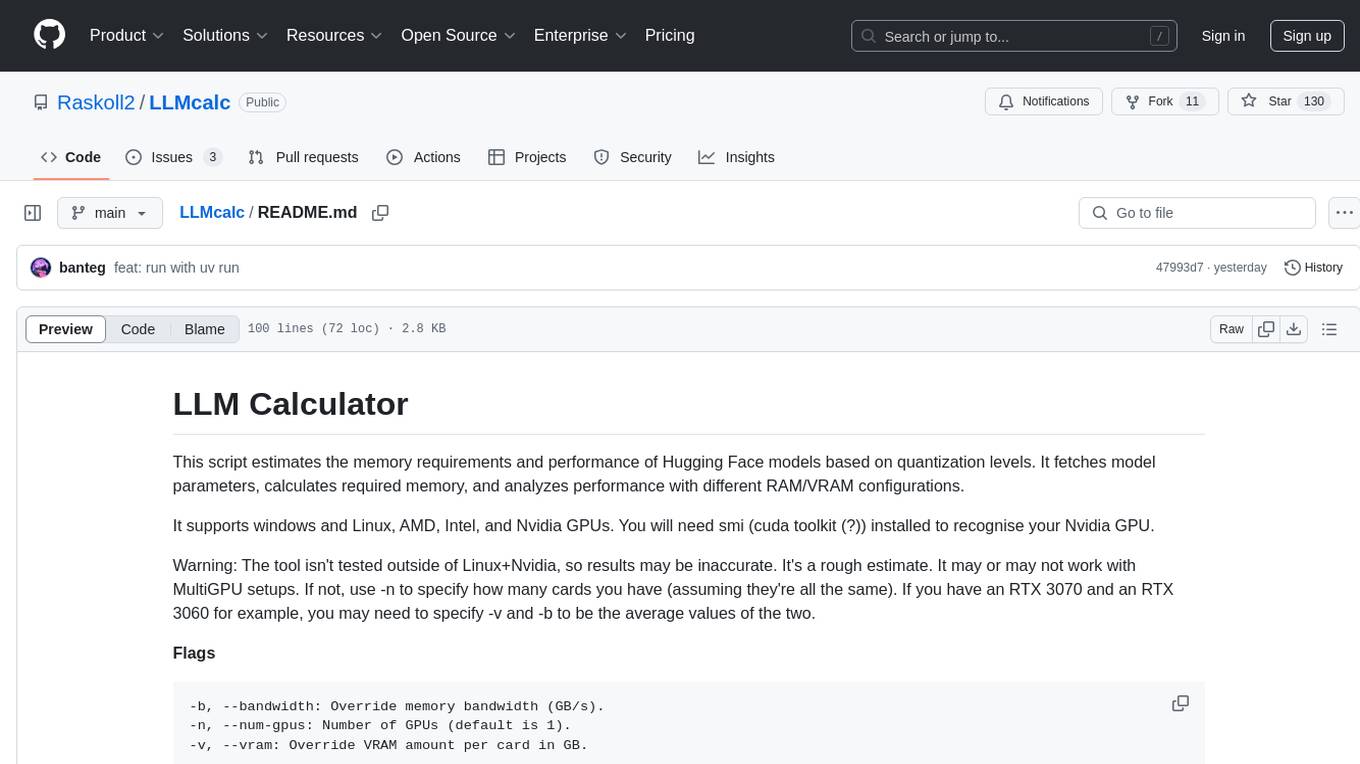
LLM Calculator is a script that estimates the memory requirements and performance of Hugging Face models based on quantization levels. It fetches model parameters, calculates required memory, and analyzes performance with different RAM/VRAM configurations. The tool supports Windows and Linux, AMD, Intel, and Nvidia GPUs. Users can input a Hugging Face model ID to get its parameter count and analyze memory requirements for various quantization schemes. The tool provides estimates for GPU offload percentage and throughput in tk/s. It requires dependencies like python, uv, pciutils for AMD + Linux, and drivers for Nvidia. The tool is designed for rough estimates and may not work with MultiGPU setups.
README:
This script estimates the memory requirements and performance of Hugging Face models based on quantization levels. It fetches model parameters, calculates required memory, and analyzes performance with different RAM/VRAM configurations.
It supports windows and Linux, AMD, Intel, and Nvidia GPUs. You will need smi (cuda toolkit (?)) installed to recognise your Nvidia GPU.
Warning: The tool isn't tested outside of Linux+Nvidia, so results may be inaccurate. It's a rough estimate. It may or may not work with MultiGPU setups. If not, use -n to specify how many cards you have (assuming they're all the same). If you have an RTX 3070 and an RTX 3060 for example, you may need to specify -v and -b to be the average values of the two.
Flags
-b, --bandwidth: Override memory bandwidth (GB/s).
-n, --num-gpus: Number of GPUs (default is 1).
-v, --vram: Override VRAM amount per card in GB.
Example:
python main.py -b 950 -n 2 -v 24
You'll need these to run it in python. 3.12.3 is what I wrote it in, but any modern version should work.
Install uv and run with:
uv run main.py
For AMD + Linux you'll need sudo apt install pciutils
Nvidia will need drivers, as long as nvidia-smi works this program should.
Intel needs lspci, dunno if that supports windows.
Enter a Hugging Face model ID (e.g., microsoft/phi-4) to get its parameter count. The script fetches system RAM and VRAM specs. You can override them with flags. It analyzes memory requirements for several quantization schemes and estimates throughput (tk/s).
Hover over a cell to see how many layers you need to offload, and what context you can fit without KV cache quantizing.
Cli Output
Enter Hugging Face model ID (e.g., microsoft/phi-4): microsoft/phi-4
Model Parameters: 14.7B params (14.70B params)
Total RAM: 33.53 GB
VRAM: 8.00 GB, ~448.0GB/s
Estimated RAM Bandwidth: 64.00 GB/s
Analysis for each quantization level:
FP8:
Run Type: Partial offload
Memory Required: 16.43 GB
GPU Offload Percentage: 48.7%
Estimated tk/s: 5.38
Q6_K_S:
Run Type: Partial offload
Memory Required: 13.86 GB
GPU Offload Percentage: 57.7%
Estimated tk/s: 7.39
Q5_K_S:
Run Type: Partial offload
Memory Required: 11.84 GB
GPU Offload Percentage: 67.6%
Estimated tk/s: 10.63
Q4_K_M:
Run Type: Partial offload
Memory Required: 10.55 GB
GPU Offload Percentage: 75.8%
Estimated tk/s: 14.71
IQ4_XS:
Run Type: Partial offload
Memory Required: 9.64 GB
GPU Offload Percentage: 83.0%
Estimated tk/s: 19.92
Q3_K_M:
Run Type: KV cache offload
Memory Required: 8.90 GB
Estimated tk/s: 45.30
IQ3_XS:
Run Type: All in VRAM
Memory Required: 7.80 GB
Estimated tk/s: 57.45
IQ2_XS:
Run Type: All in VRAM
Memory Required: 6.14 GB
Estimated tk/s: 72.90
For Tasks:
Click tags to check more tools for each tasksFor Jobs:
Alternative AI tools for LLMcalc
Similar Open Source Tools

LLMcalc
LLM Calculator is a script that estimates the memory requirements and performance of Hugging Face models based on quantization levels. It fetches model parameters, calculates required memory, and analyzes performance with different RAM/VRAM configurations. The tool supports Windows and Linux, AMD, Intel, and Nvidia GPUs. Users can input a Hugging Face model ID to get its parameter count and analyze memory requirements for various quantization schemes. The tool provides estimates for GPU offload percentage and throughput in tk/s. It requires dependencies like python, uv, pciutils for AMD + Linux, and drivers for Nvidia. The tool is designed for rough estimates and may not work with MultiGPU setups.
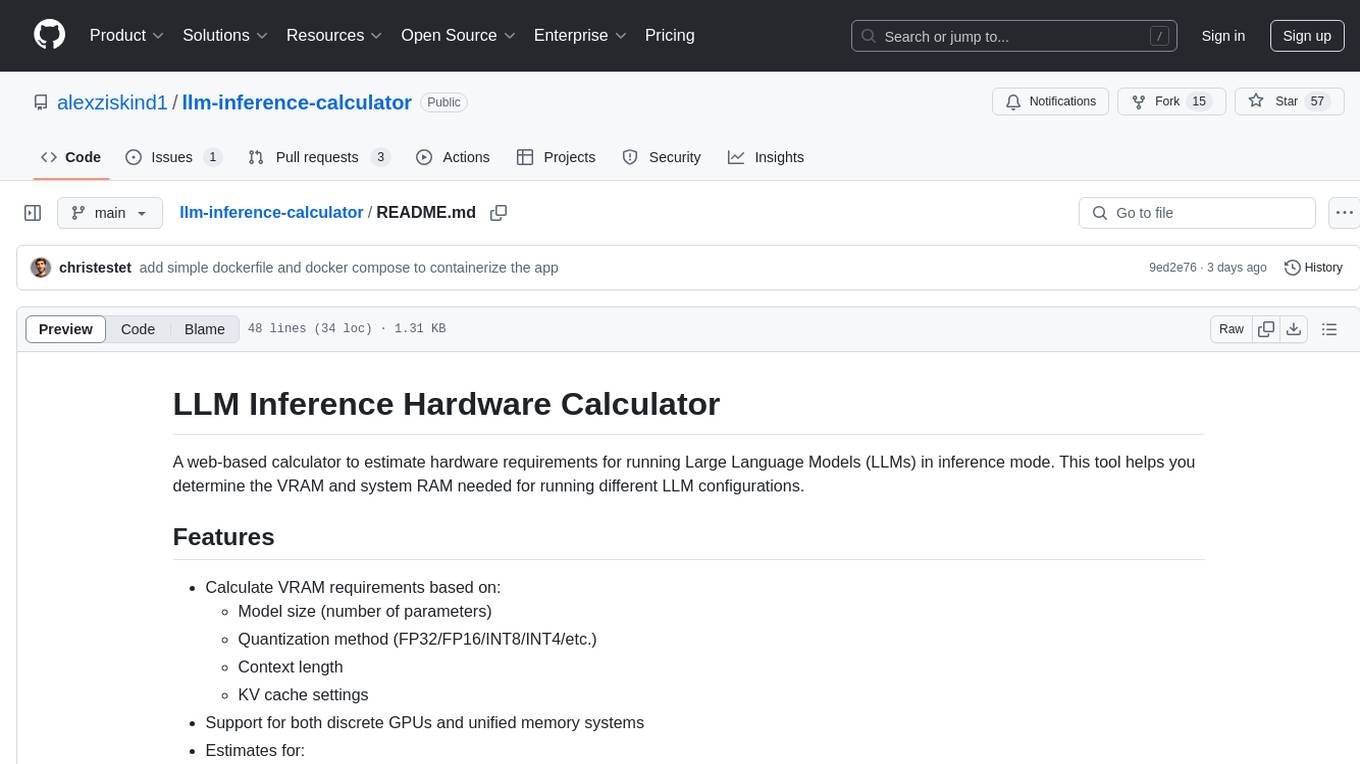
llm-inference-calculator
A web-based calculator to estimate hardware requirements for running Large Language Models (LLMs) in inference mode. This tool helps determine VRAM and system RAM needed for different LLM configurations. It calculates VRAM requirements based on model size, quantization method, context length, and KV cache settings. It provides estimates for required VRAM, minimum system RAM, on-disk model size, and number of GPUs needed. The project uses React, TypeScript, and Vite. Docker support is available with instructions provided. The tool provides approximations for calculations, includes overhead for KV cache, and assumes certain percentages for unified memory and discrete GPU calculations.
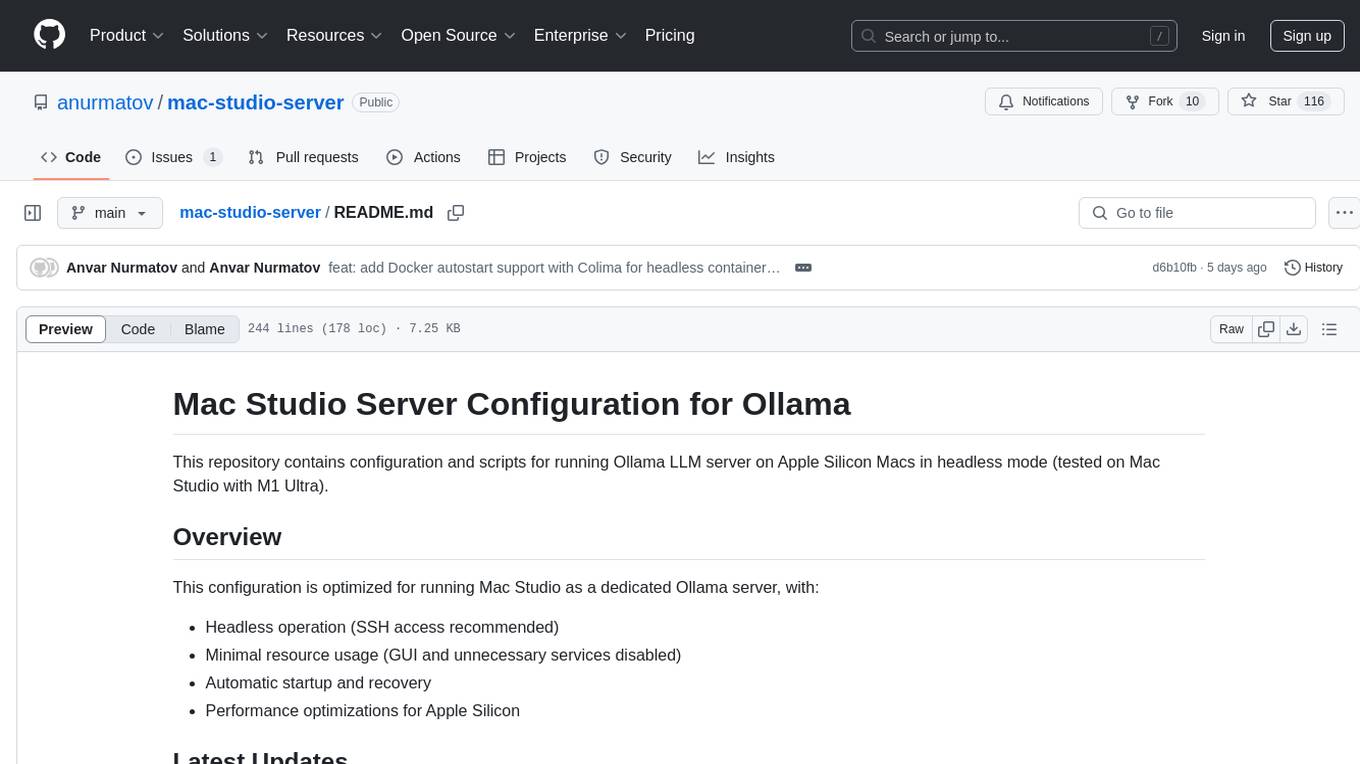
mac-studio-server
This repository provides configuration and scripts for running Ollama LLM server on Apple Silicon Macs in headless mode, optimized for performance and resource usage. It includes features like automatic startup, system resource optimization, external network access, proper logging setup, and SSH-based remote management. Users can customize the Ollama service configuration and enable optional GPU memory optimization and Docker autostart for container applications. The installation process disables unnecessary system services, configures power management, and optimizes for background operation while maintaining Screen Sharing capability for remote management. Performance considerations focus on reducing memory usage, disabling GUI-related services, minimizing background processes, preventing sleep/hibernation, and optimizing for headless operation.
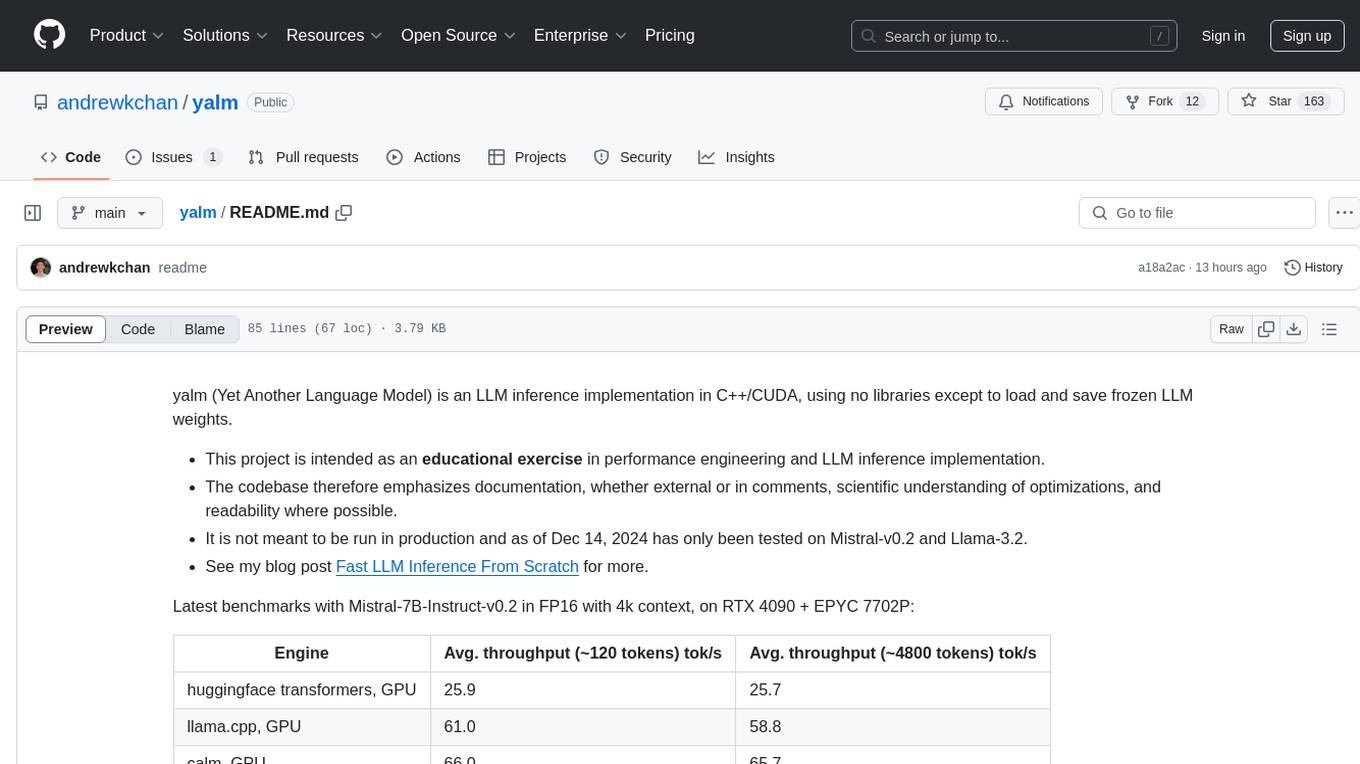
yalm
Yalm (Yet Another Language Model) is an LLM inference implementation in C++/CUDA, emphasizing performance engineering, documentation, scientific optimizations, and readability. It is not for production use and has been tested on Mistral-v0.2 and Llama-3.2. Requires C++20-compatible compiler, CUDA toolkit, and LLM safetensor weights in huggingface format converted to .yalm file.
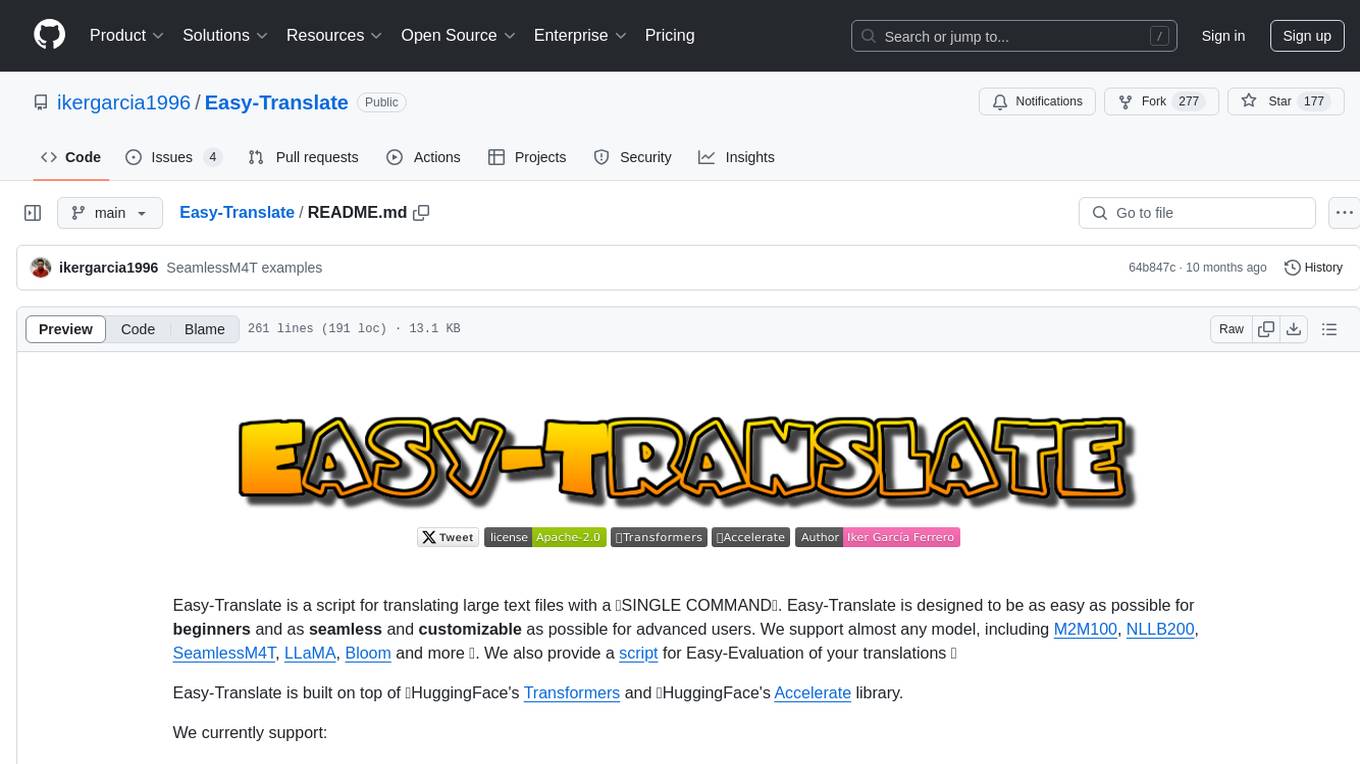
Easy-Translate
Easy-Translate is a script designed for translating large text files with a single command. It supports various models like M2M100, NLLB200, SeamlessM4T, LLaMA, and Bloom. The tool is beginner-friendly and offers seamless and customizable features for advanced users. It allows acceleration on CPU, multi-CPU, GPU, multi-GPU, and TPU, with support for different precisions and decoding strategies. Easy-Translate also provides an evaluation script for translations. Built on HuggingFace's Transformers and Accelerate library, it supports prompt usage and loading huge models efficiently.
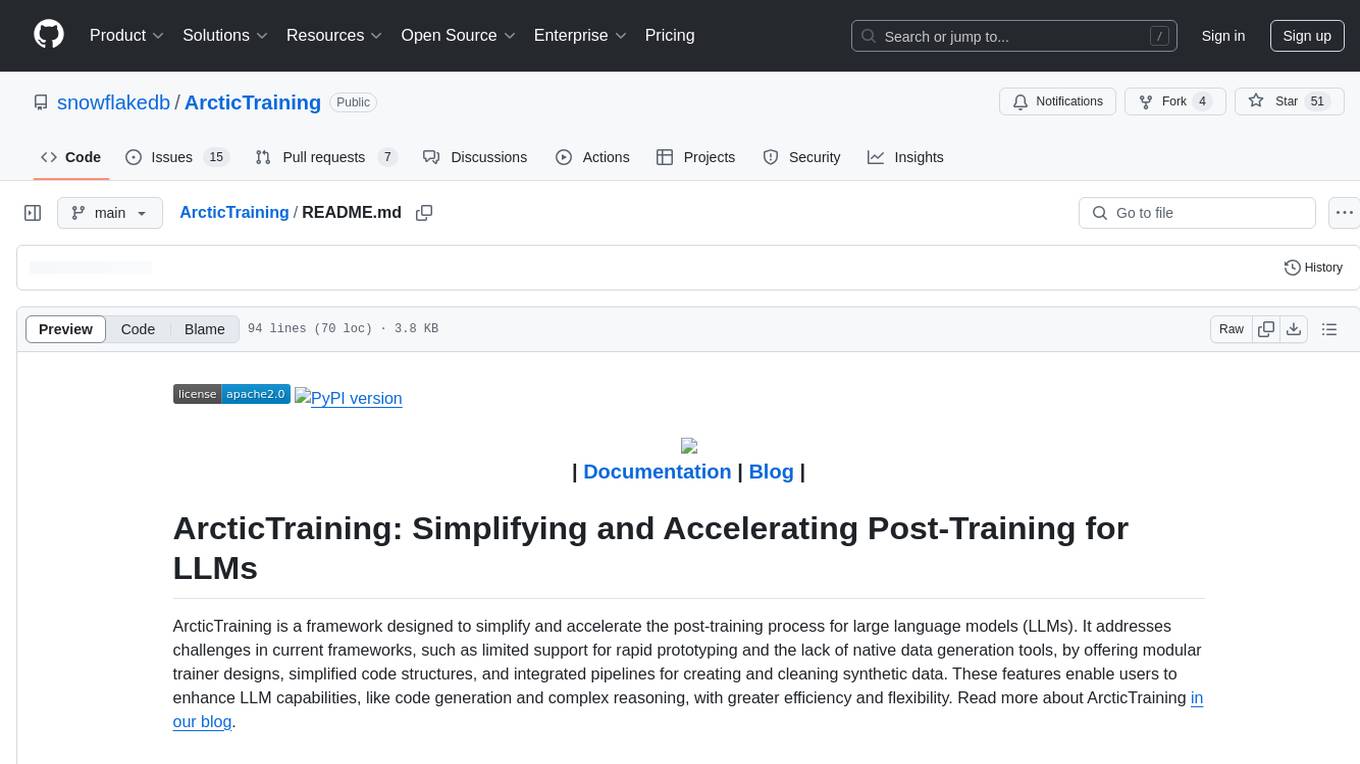
ArcticTraining
ArcticTraining is a framework designed to simplify and accelerate the post-training process for large language models (LLMs). It offers modular trainer designs, simplified code structures, and integrated pipelines for creating and cleaning synthetic data, enabling users to enhance LLM capabilities like code generation and complex reasoning with greater efficiency and flexibility.
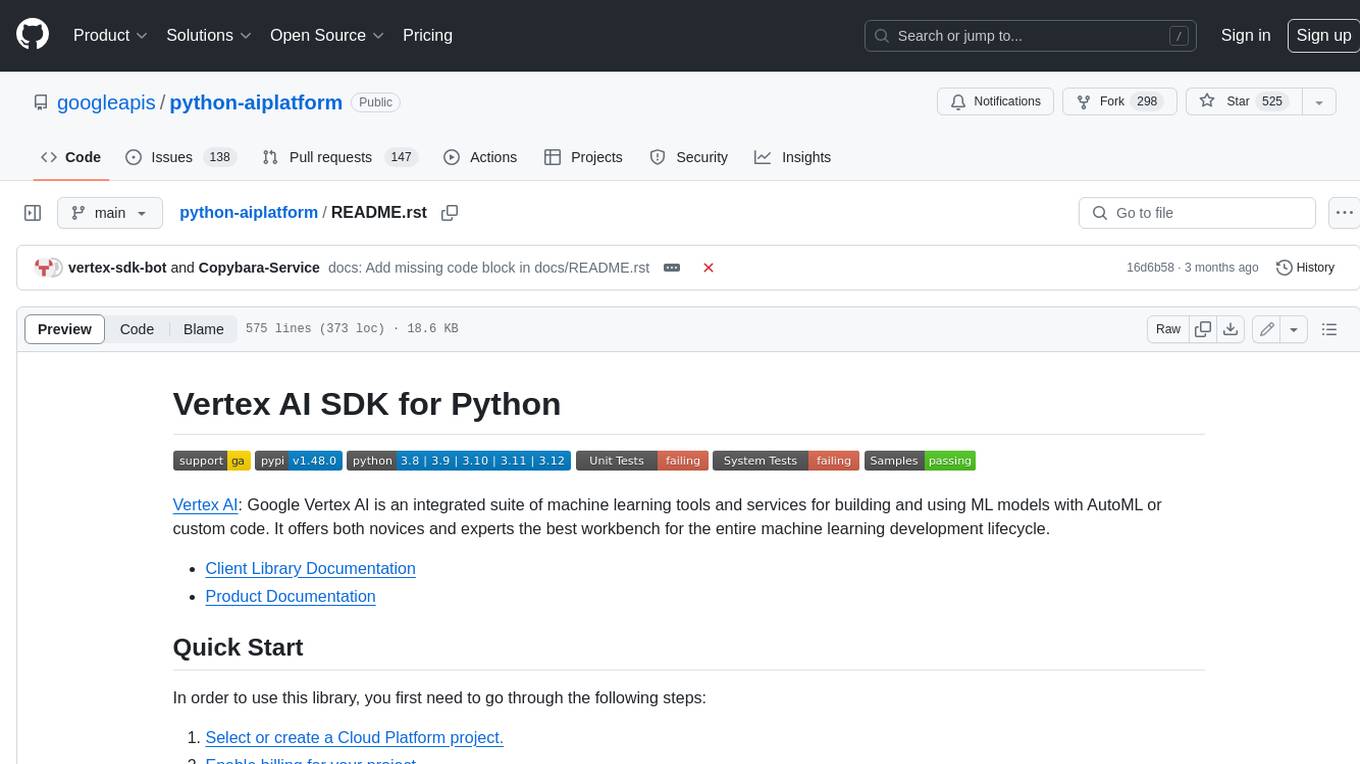
python-aiplatform
The Vertex AI SDK for Python is a library that provides a convenient way to use the Vertex AI API. It offers a high-level interface for creating and managing Vertex AI resources, such as datasets, models, and endpoints. The SDK also provides support for training and deploying custom models, as well as using AutoML models. With the Vertex AI SDK for Python, you can quickly and easily build and deploy machine learning models on Vertex AI.
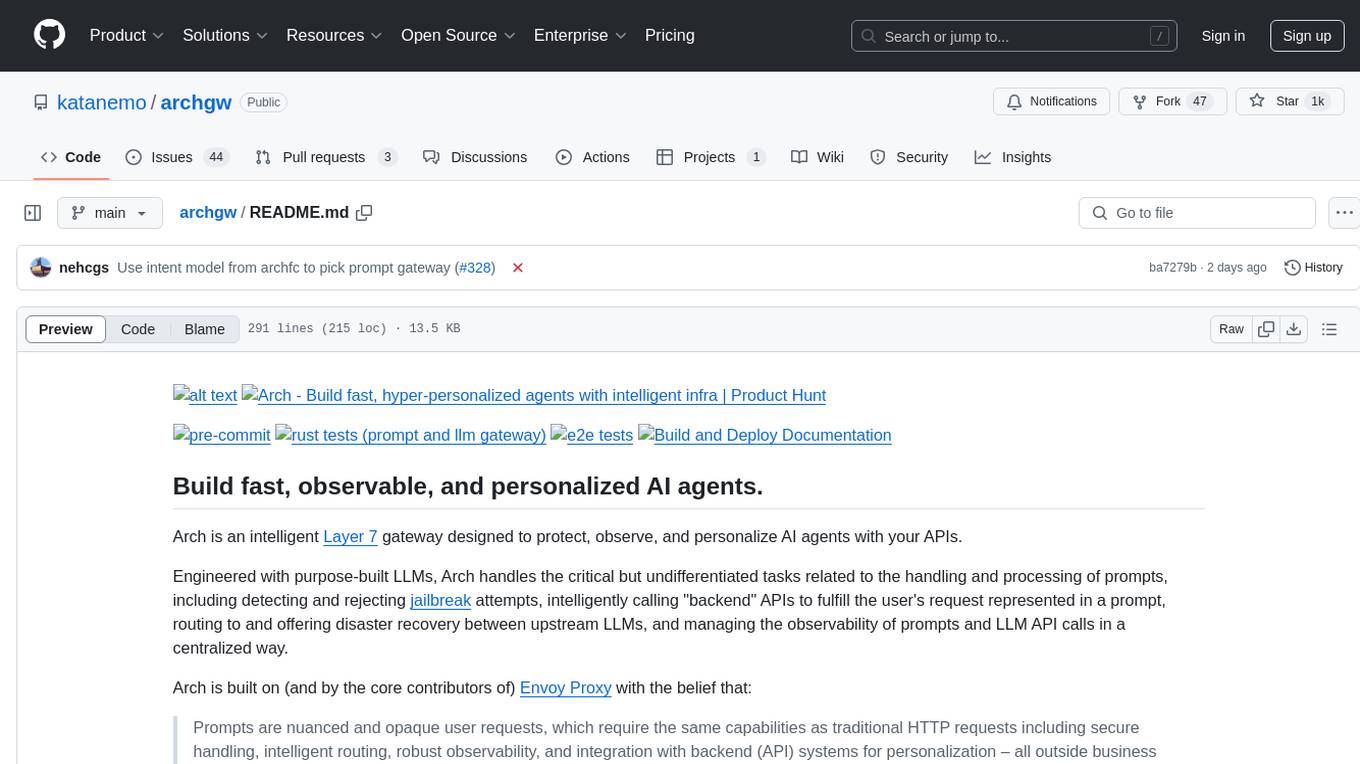
archgw
Arch is an intelligent Layer 7 gateway designed to protect, observe, and personalize AI agents with APIs. It handles tasks related to prompts, including detecting jailbreak attempts, calling backend APIs, routing between LLMs, and managing observability. Built on Envoy Proxy, it offers features like function calling, prompt guardrails, traffic management, and observability. Users can build fast, observable, and personalized AI agents using Arch to improve speed, security, and personalization of GenAI apps.

gpt4all
GPT4All is an ecosystem to run powerful and customized large language models that work locally on consumer grade CPUs and any GPU. Note that your CPU needs to support AVX or AVX2 instructions. Learn more in the documentation. A GPT4All model is a 3GB - 8GB file that you can download and plug into the GPT4All open-source ecosystem software. Nomic AI supports and maintains this software ecosystem to enforce quality and security alongside spearheading the effort to allow any person or enterprise to easily train and deploy their own on-edge large language models.
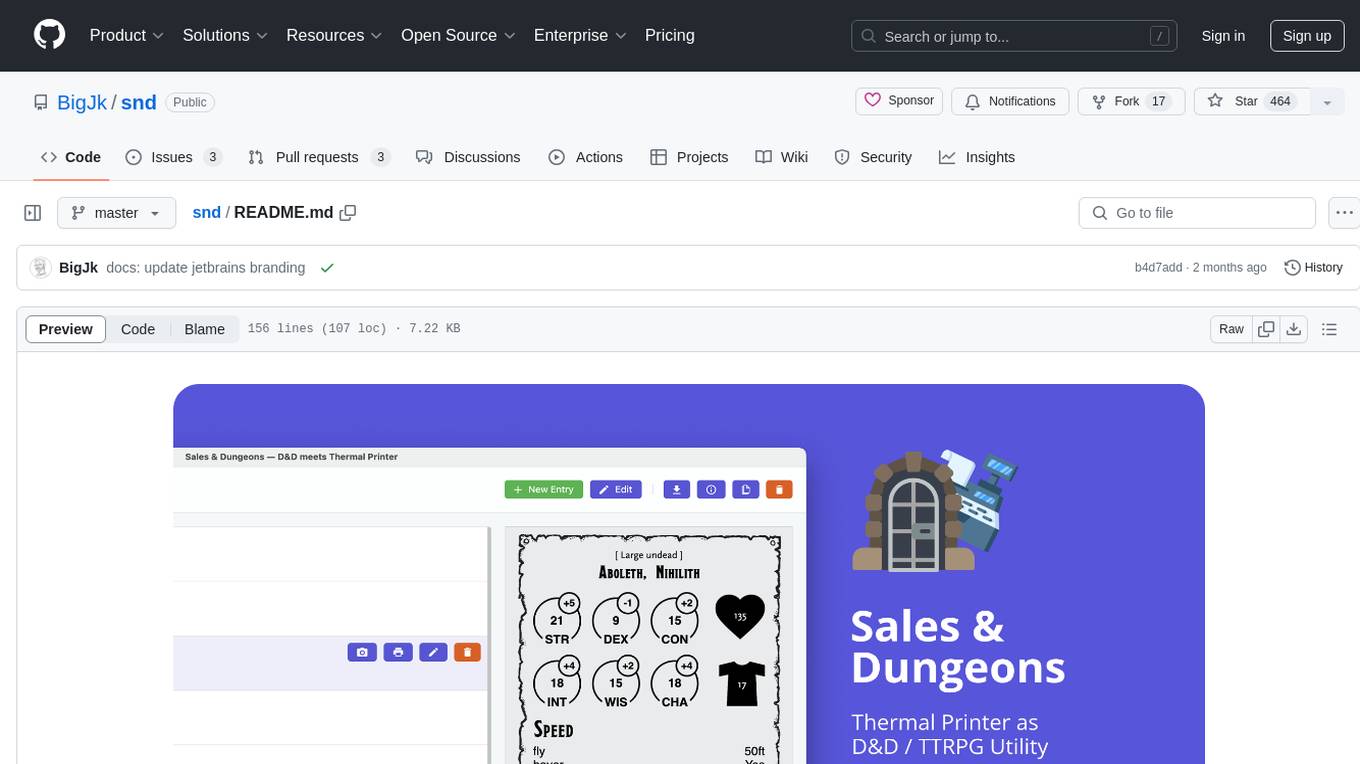
snd
Sales & Dungeons is a tool that utilizes thermal printers for creating customizable handouts, quick references, and more for Dungeons and Dragons sessions. It offers extensive templating and random generation systems, supports various connection methods, and allows importing/exporting templates and data sources. Users can access external data sources like Open5e, import data from CSV and other formats, and utilize AI prompt generation and translation. The tool supports cloud sync and is compatible with multiple operating systems and devices.
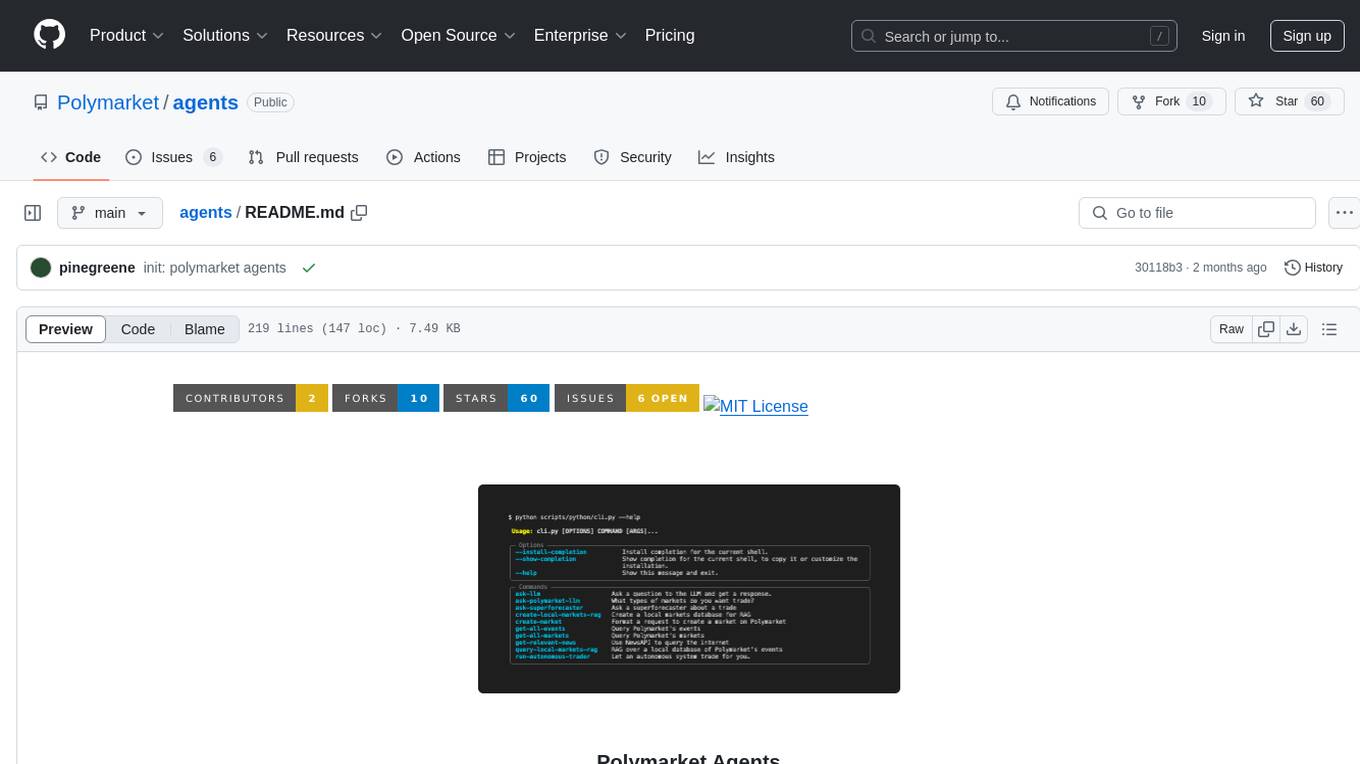
agents
Polymarket Agents is a developer framework and set of utilities for building AI agents to trade autonomously on Polymarket. It integrates with Polymarket API, provides AI agent utilities for prediction markets, supports local and remote RAG, sources data from various services, and offers comprehensive LLM tools for prompt engineering. The architecture features modular components like APIs and scripts for managing local environments, server set-up, and CLI for end-user commands.
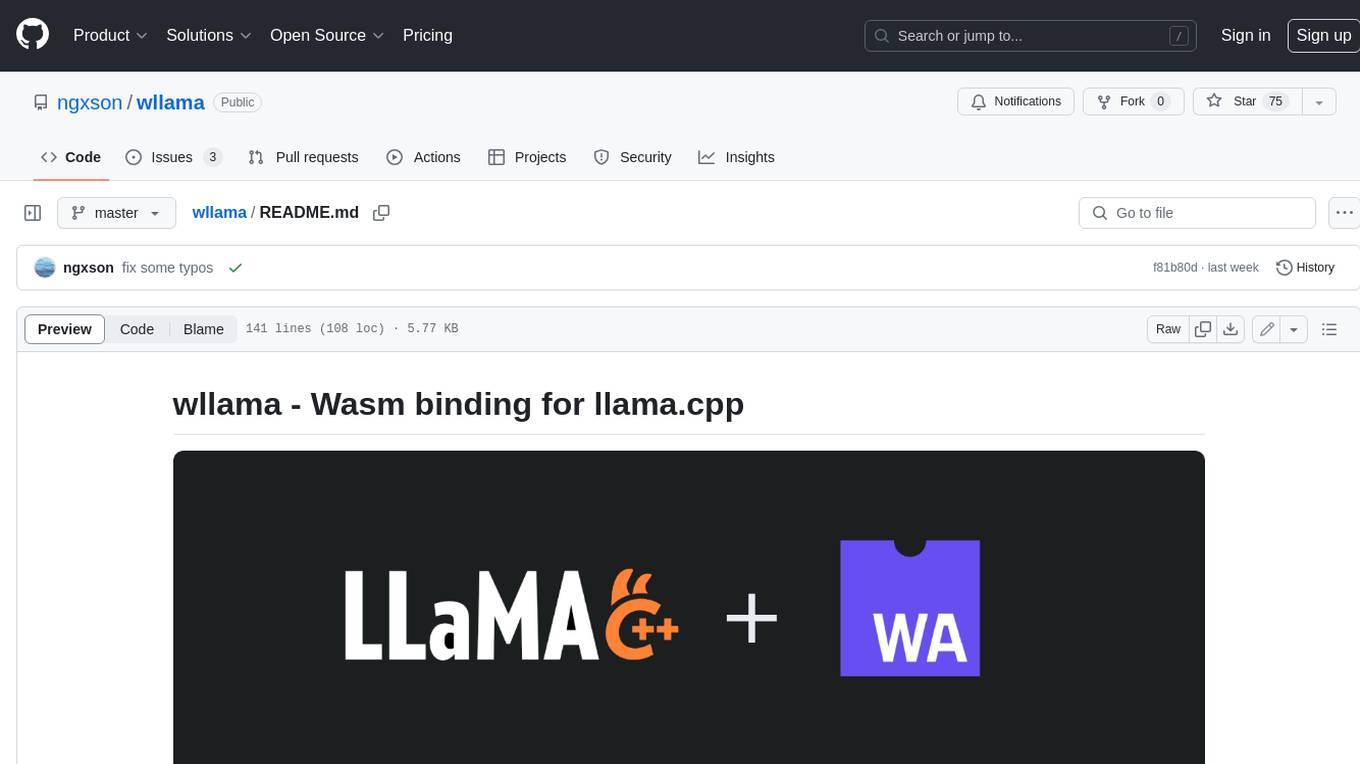
wllama
Wllama is a WebAssembly binding for llama.cpp, a high-performance and lightweight language model library. It enables you to run inference directly on the browser without the need for a backend or GPU. Wllama provides both high-level and low-level APIs, allowing you to perform various tasks such as completions, embeddings, tokenization, and more. It also supports model splitting, enabling you to load large models in parallel for faster download. With its Typescript support and pre-built npm package, Wllama is easy to integrate into your React Typescript projects.
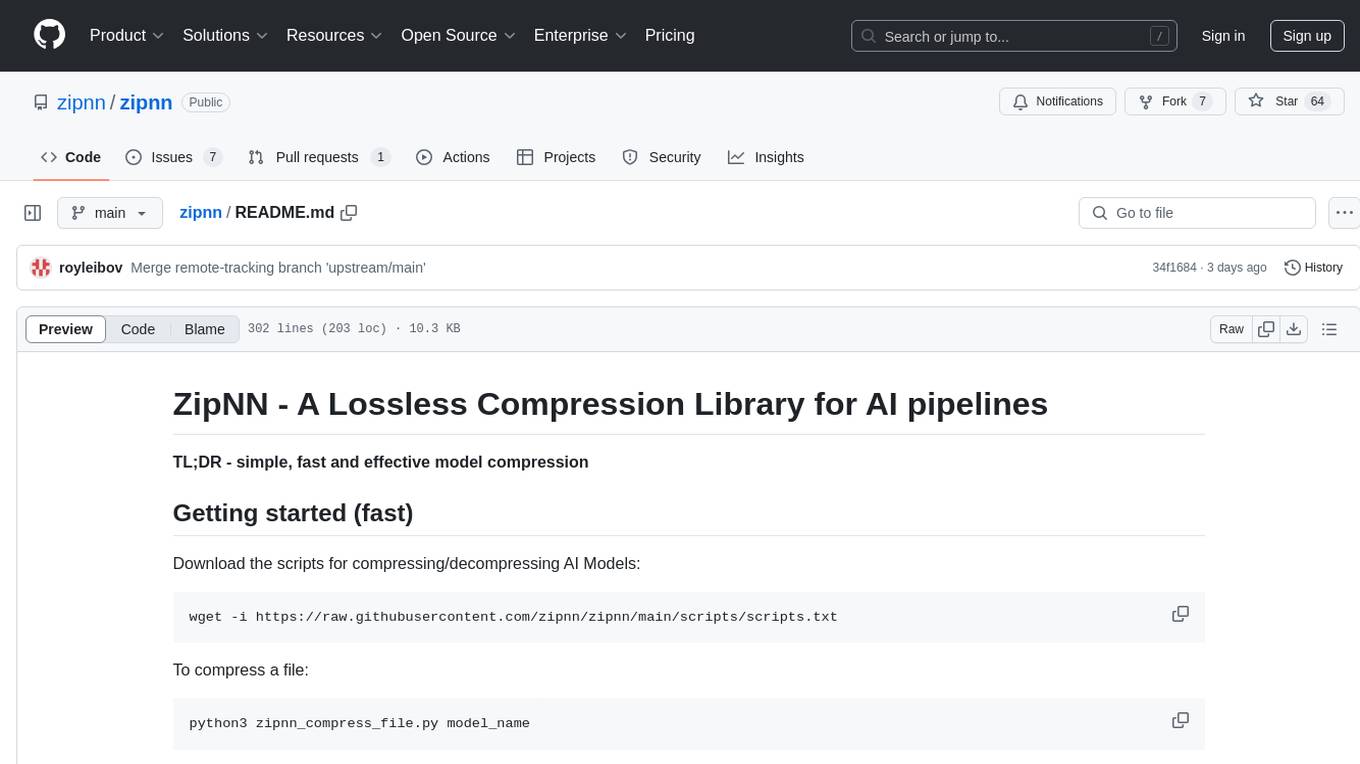
zipnn
ZipNN is a lossless and near-lossless compression library optimized for numbers/tensors in the Foundation Models environment. It automatically prepares data for compression based on its type, allowing users to focus on core tasks without worrying about compression complexities. The library delivers effective compression techniques for different data types and structures, achieving high compression ratios and rates. ZipNN supports various compression methods like ZSTD, lz4, and snappy, and provides ready-made scripts for file compression/decompression. Users can also manually import the package to compress and decompress data. The library offers advanced configuration options for customization and validation tests for different input and compression types.
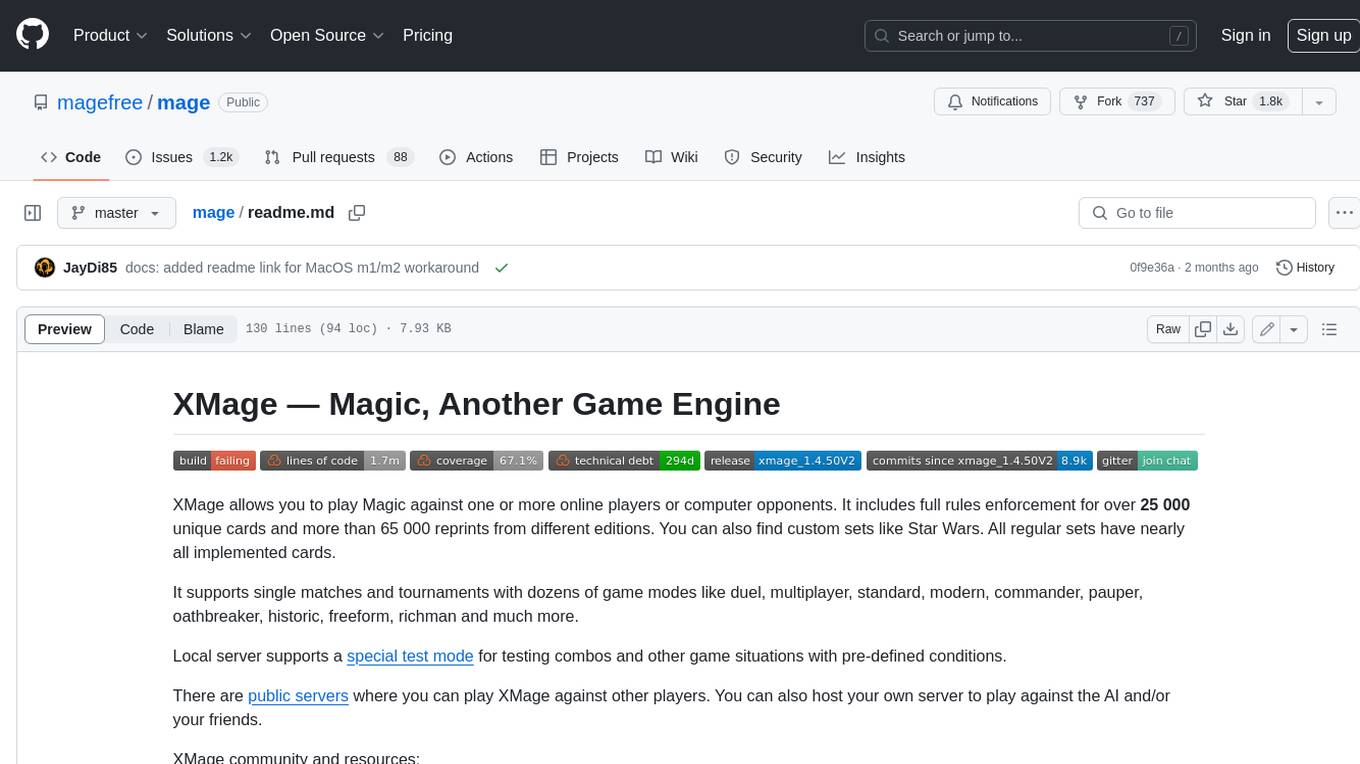
mage
XMage is an open-source, cross-platform application that allows users to play the collectible card game Magic: The Gathering online against other players or computer opponents. It supports over 25,000 unique cards and more than 65,000 reprints from different editions, including custom sets like Star Wars. XMage supports single matches and tournaments with dozens of game modes, including duel, multiplayer, standard, modern, commander, pauper, oathbreaker, historic, freeform, and richman. It also features a deck editor, a player rating system, and support for special formats like Commander, Oathbreaker, Cube, Tiny Leaders, Super Standard, and Historic Standard.

instructor-php
Instructor for PHP is a library designed for structured data extraction in PHP, powered by Large Language Models (LLMs). It simplifies the process of extracting structured, validated data from unstructured text or chat sequences. Instructor enhances workflow by providing a response model, validation capabilities, and max retries for requests. It supports classes as response models and provides features like partial results, string input, extracting scalar and enum values, and specifying data models using PHP type hints or DocBlock comments. The library allows customization of validation and provides detailed event notifications during request processing. Instructor is compatible with PHP 8.2+ and leverages PHP reflection, Symfony components, and SaloonPHP for communication with LLM API providers.
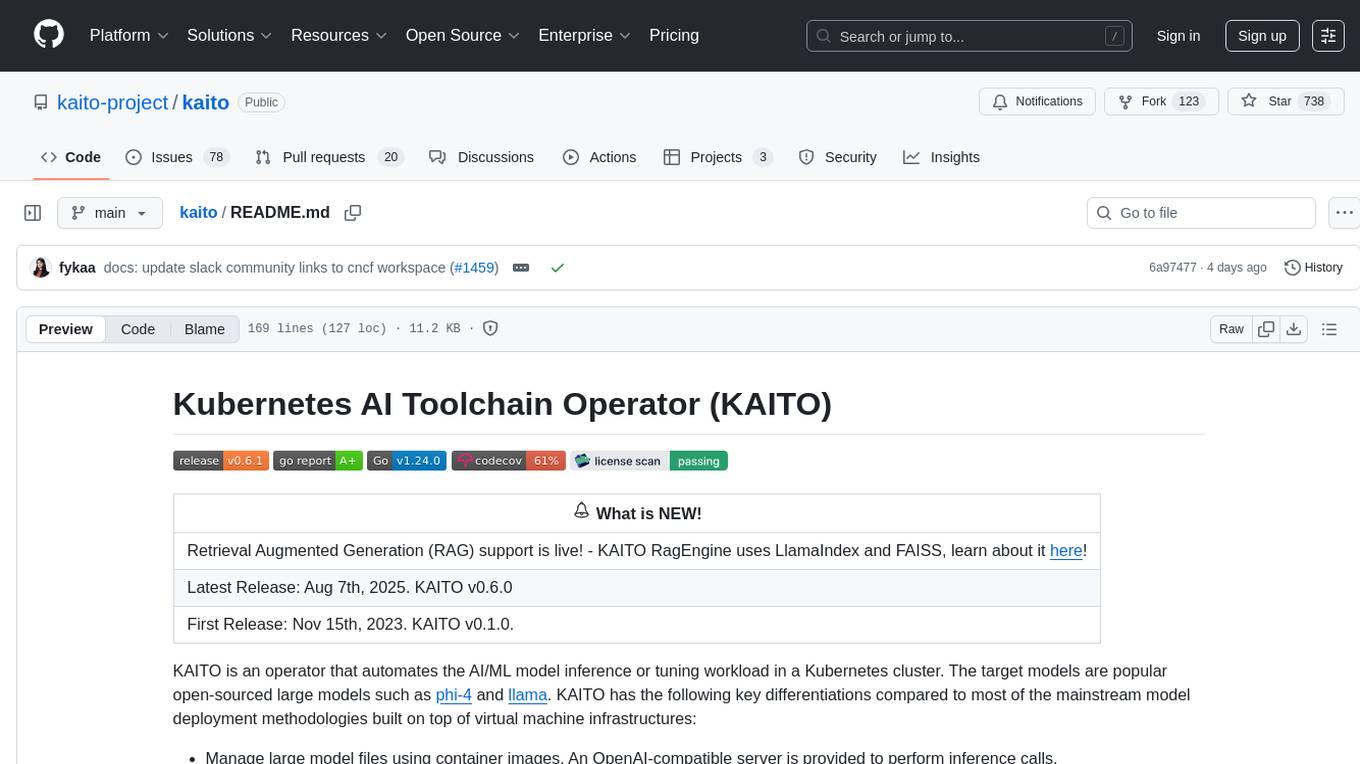
kaito
KAITO is an operator that automates the AI/ML model inference or tuning workload in a Kubernetes cluster. It manages large model files using container images, provides preset configurations to avoid adjusting workload parameters based on GPU hardware, supports popular open-sourced inference runtimes, auto-provisions GPU nodes based on model requirements, and hosts large model images in the public Microsoft Container Registry. Using KAITO simplifies the workflow of onboarding large AI inference models in Kubernetes.
For similar tasks
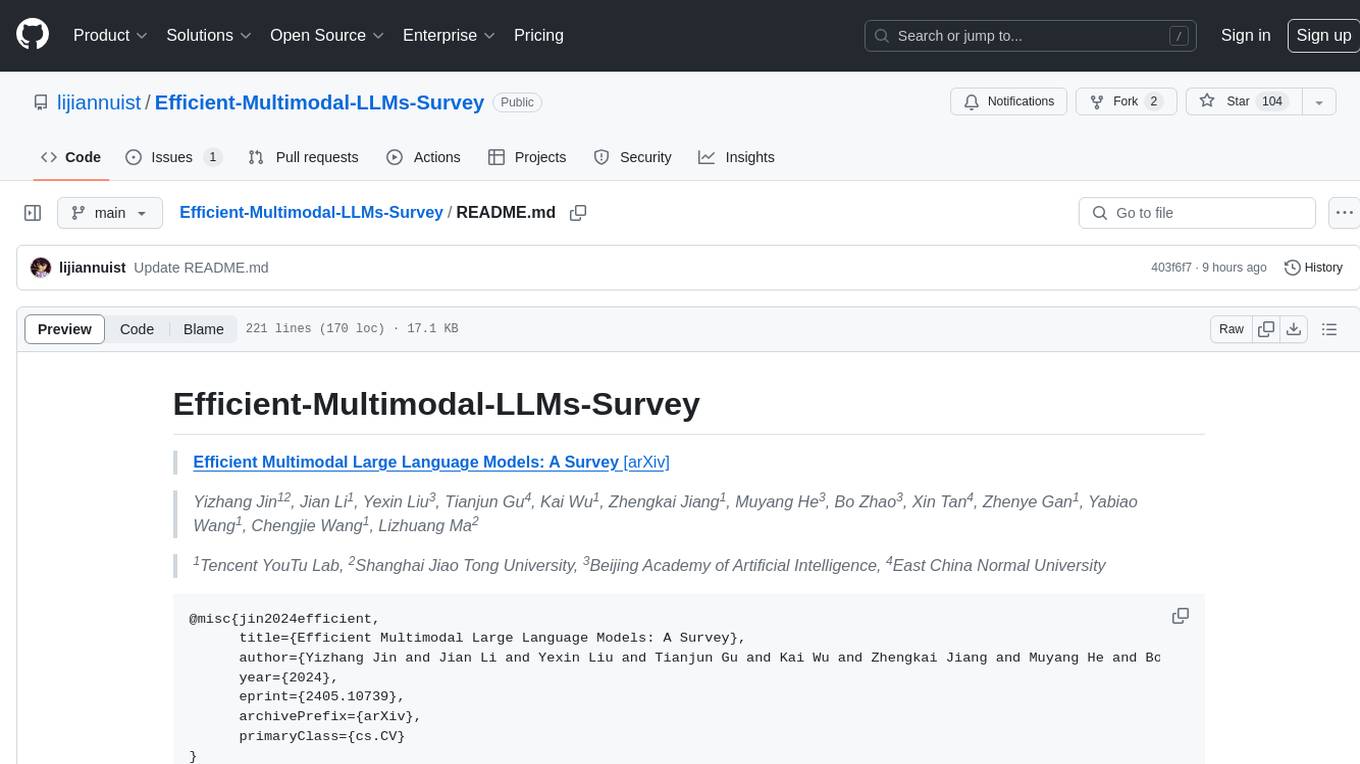
Efficient-Multimodal-LLMs-Survey
Efficient Multimodal Large Language Models: A Survey provides a comprehensive review of efficient and lightweight Multimodal Large Language Models (MLLMs), focusing on model size reduction and cost efficiency for edge computing scenarios. The survey covers the timeline of efficient MLLMs, research on efficient structures and strategies, and applications. It discusses current limitations and future directions in efficient MLLM research.
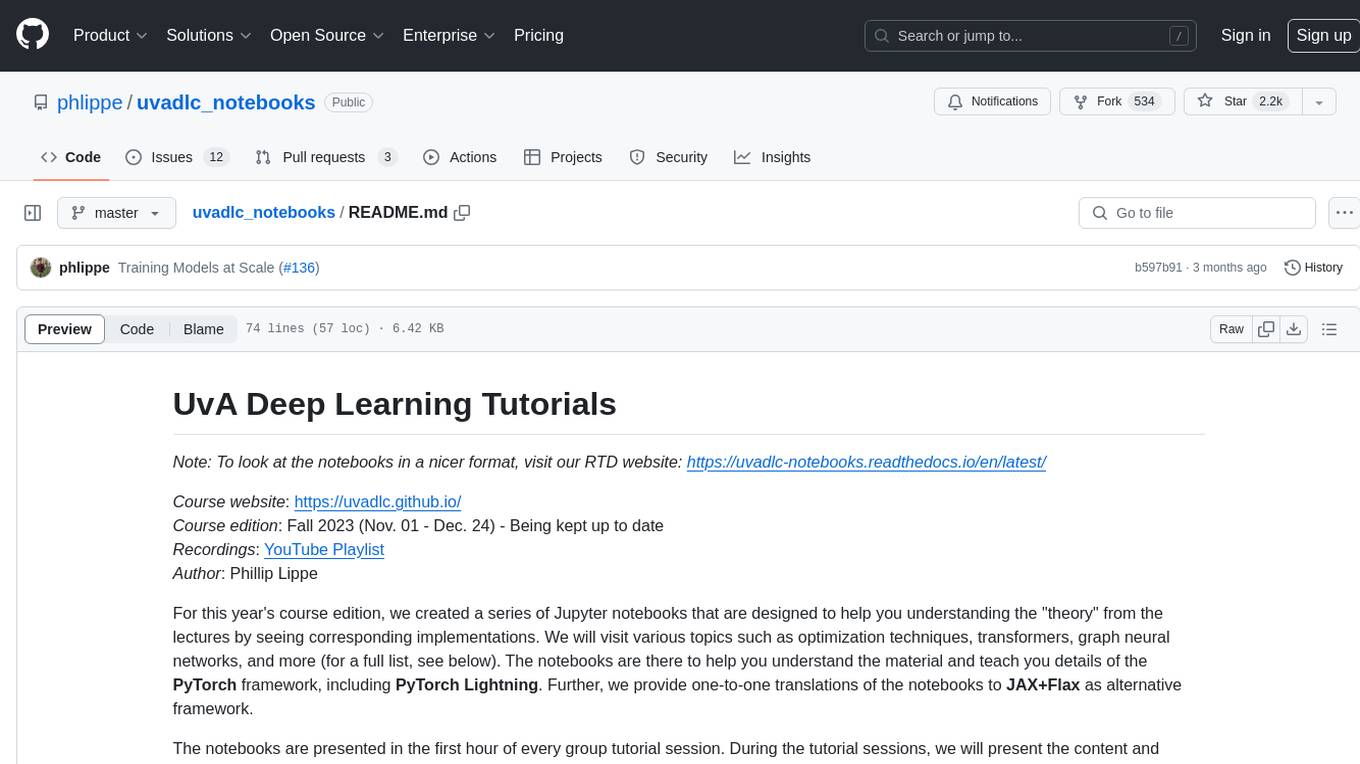
uvadlc_notebooks
The UvA Deep Learning Tutorials repository contains a series of Jupyter notebooks designed to help understand theoretical concepts from lectures by providing corresponding implementations. The notebooks cover topics such as optimization techniques, transformers, graph neural networks, and more. They aim to teach details of the PyTorch framework, including PyTorch Lightning, with alternative translations to JAX+Flax. The tutorials are integrated as official tutorials of PyTorch Lightning and are relevant for graded assignments and exams.
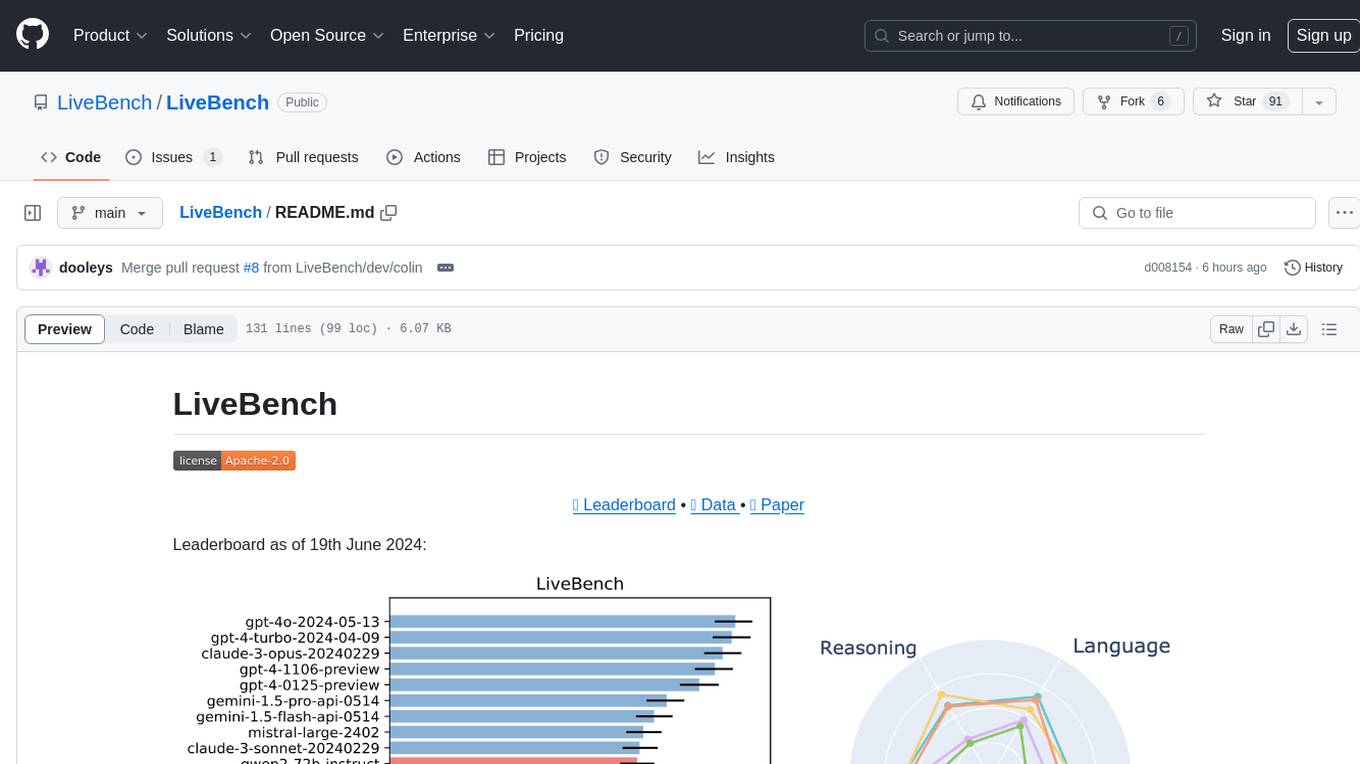
LiveBench
LiveBench is a benchmark tool designed for Language Model Models (LLMs) with a focus on limiting contamination through monthly new questions based on recent datasets, arXiv papers, news articles, and IMDb movie synopses. It provides verifiable, objective ground-truth answers for accurate scoring without an LLM judge. The tool offers 18 diverse tasks across 6 categories and promises to release more challenging tasks over time. LiveBench is built on FastChat's llm_judge module and incorporates code from LiveCodeBench and IFEval.
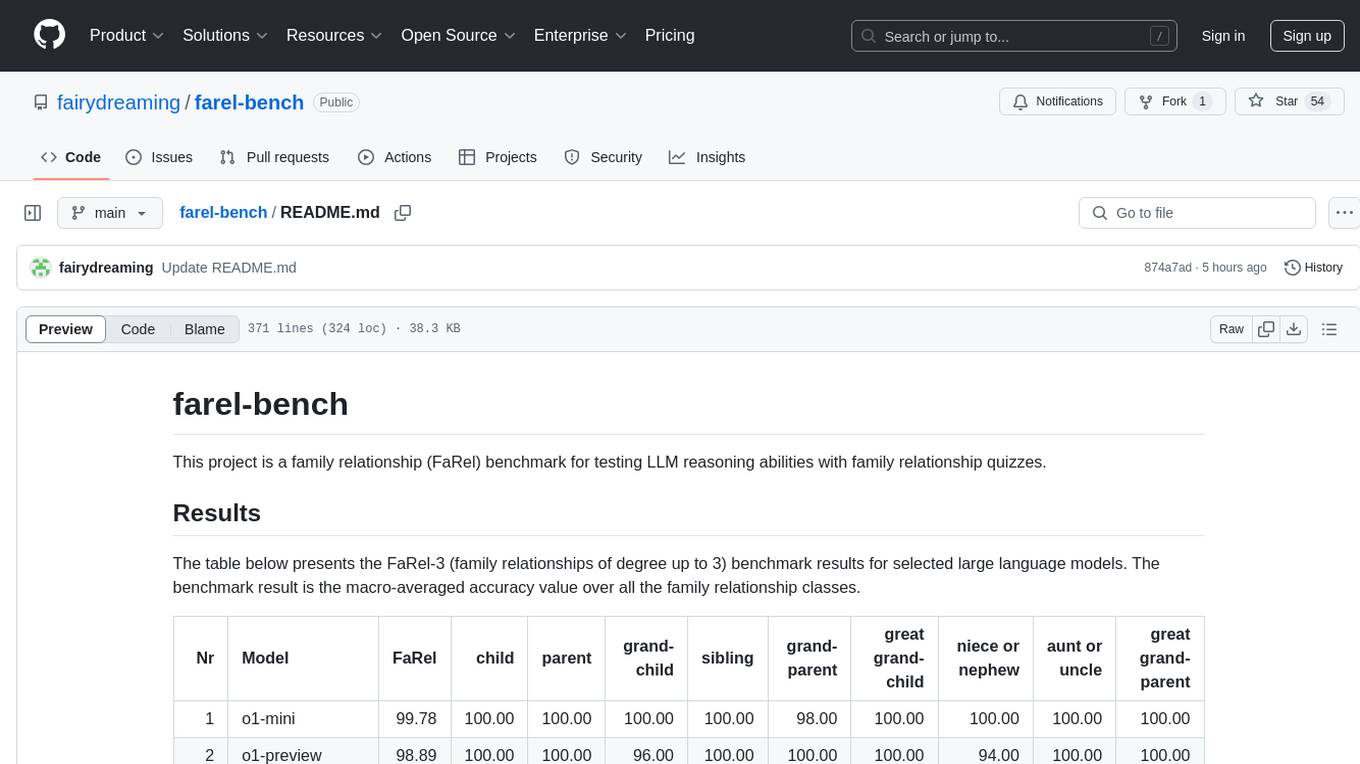
farel-bench
The 'farel-bench' project is a benchmark tool for testing LLM reasoning abilities with family relationship quizzes. It generates quizzes based on family relationships of varying degrees and measures the accuracy of large language models in solving these quizzes. The project provides scripts for generating quizzes, running models locally or via APIs, and calculating benchmark metrics. The quizzes are designed to test logical reasoning skills using family relationship concepts, with the goal of evaluating the performance of language models in this specific domain.

LLMcalc
LLM Calculator is a script that estimates the memory requirements and performance of Hugging Face models based on quantization levels. It fetches model parameters, calculates required memory, and analyzes performance with different RAM/VRAM configurations. The tool supports Windows and Linux, AMD, Intel, and Nvidia GPUs. Users can input a Hugging Face model ID to get its parameter count and analyze memory requirements for various quantization schemes. The tool provides estimates for GPU offload percentage and throughput in tk/s. It requires dependencies like python, uv, pciutils for AMD + Linux, and drivers for Nvidia. The tool is designed for rough estimates and may not work with MultiGPU setups.
For similar jobs

weave
Weave is a toolkit for developing Generative AI applications, built by Weights & Biases. With Weave, you can log and debug language model inputs, outputs, and traces; build rigorous, apples-to-apples evaluations for language model use cases; and organize all the information generated across the LLM workflow, from experimentation to evaluations to production. Weave aims to bring rigor, best-practices, and composability to the inherently experimental process of developing Generative AI software, without introducing cognitive overhead.

LLMStack
LLMStack is a no-code platform for building generative AI agents, workflows, and chatbots. It allows users to connect their own data, internal tools, and GPT-powered models without any coding experience. LLMStack can be deployed to the cloud or on-premise and can be accessed via HTTP API or triggered from Slack or Discord.

VisionCraft
The VisionCraft API is a free API for using over 100 different AI models. From images to sound.

kaito
Kaito is an operator that automates the AI/ML inference model deployment in a Kubernetes cluster. It manages large model files using container images, avoids tuning deployment parameters to fit GPU hardware by providing preset configurations, auto-provisions GPU nodes based on model requirements, and hosts large model images in the public Microsoft Container Registry (MCR) if the license allows. Using Kaito, the workflow of onboarding large AI inference models in Kubernetes is largely simplified.

PyRIT
PyRIT is an open access automation framework designed to empower security professionals and ML engineers to red team foundation models and their applications. It automates AI Red Teaming tasks to allow operators to focus on more complicated and time-consuming tasks and can also identify security harms such as misuse (e.g., malware generation, jailbreaking), and privacy harms (e.g., identity theft). The goal is to allow researchers to have a baseline of how well their model and entire inference pipeline is doing against different harm categories and to be able to compare that baseline to future iterations of their model. This allows them to have empirical data on how well their model is doing today, and detect any degradation of performance based on future improvements.

tabby
Tabby is a self-hosted AI coding assistant, offering an open-source and on-premises alternative to GitHub Copilot. It boasts several key features: * Self-contained, with no need for a DBMS or cloud service. * OpenAPI interface, easy to integrate with existing infrastructure (e.g Cloud IDE). * Supports consumer-grade GPUs.

spear
SPEAR (Simulator for Photorealistic Embodied AI Research) is a powerful tool for training embodied agents. It features 300 unique virtual indoor environments with 2,566 unique rooms and 17,234 unique objects that can be manipulated individually. Each environment is designed by a professional artist and features detailed geometry, photorealistic materials, and a unique floor plan and object layout. SPEAR is implemented as Unreal Engine assets and provides an OpenAI Gym interface for interacting with the environments via Python.

Magick
Magick is a groundbreaking visual AIDE (Artificial Intelligence Development Environment) for no-code data pipelines and multimodal agents. Magick can connect to other services and comes with nodes and templates well-suited for intelligent agents, chatbots, complex reasoning systems and realistic characters.
